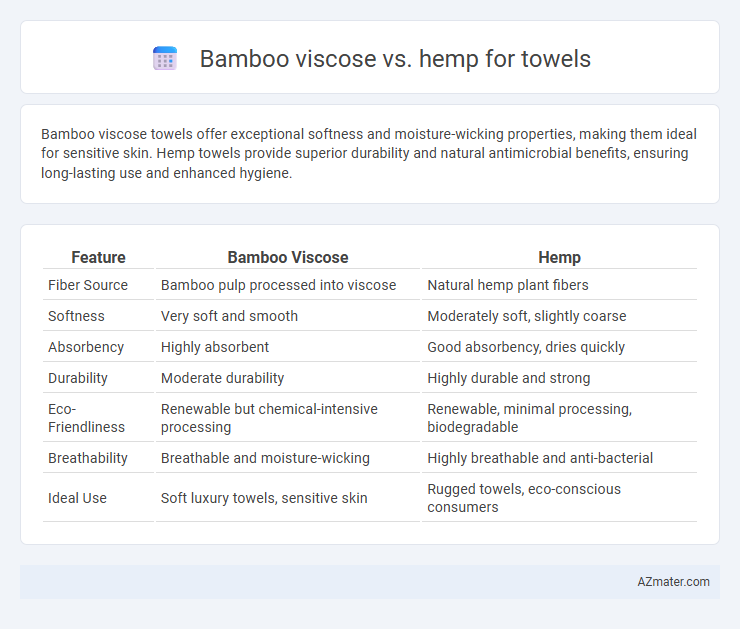Bamboo viscose towels offer exceptional softness and moisture-wicking properties, making them ideal for sensitive skin. Hemp towels provide superior durability and natural antimicrobial benefits, ensuring long-lasting use and enhanced hygiene.
Table of Comparison
| Feature | Bamboo Viscose | Hemp |
|---|---|---|
| Fiber Source | Bamboo pulp processed into viscose | Natural hemp plant fibers |
| Softness | Very soft and smooth | Moderately soft, slightly coarse |
| Absorbency | Highly absorbent | Good absorbency, dries quickly |
| Durability | Moderate durability | Highly durable and strong |
| Eco-Friendliness | Renewable but chemical-intensive processing | Renewable, minimal processing, biodegradable |
| Breathability | Breathable and moisture-wicking | Highly breathable and anti-bacterial |
| Ideal Use | Soft luxury towels, sensitive skin | Rugged towels, eco-conscious consumers |
Introduction: Why Material Matters in Towels
Towel material significantly impacts absorbency, softness, durability, and sustainability, making the choice between bamboo viscose and hemp essential for quality and eco-friendliness. Bamboo viscose offers exceptional softness and moisture-wicking properties, while hemp provides superior strength, quick-drying capabilities, and natural antimicrobial qualities. Understanding these material characteristics helps select towels that meet personal comfort needs and environmental considerations.
What is Bamboo Viscose?
Bamboo viscose is a soft, breathable fiber made by chemically processing bamboo pulp into viscose rayon, offering excellent moisture absorption and a silky texture ideal for towels. Unlike hemp, which is naturally coarse, bamboo viscose provides a smooth and luxurious feel while maintaining strong antibacterial properties and eco-friendly benefits. Its hypoallergenic nature and rapid moisture-wicking ability make bamboo viscose towels highly suitable for sensitive skin and quick drying.
What is Hemp Fiber?
Hemp fiber is derived from the stalks of the Cannabis sativa plant, known for its durability, breathability, and natural resistance to mold and UV rays, making it an excellent material for towels. Compared to bamboo viscose, hemp fibers are stronger and more absorbent, offering long-lasting softness and quick drying properties. Its eco-friendly cultivation requires less water and pesticides, enhancing sustainability in textile production.
Softness and Comfort Comparison
Bamboo viscose towels offer superior softness due to their fine fibers, providing a plush, silky feel that enhances comfort during use. Hemp towels, while slightly rougher, excel in durability and moisture-wicking properties, making them ideal for long-term use and quick drying. When prioritizing softness and immediate comfort, bamboo viscose is the preferred choice, whereas hemp balances comfort with robust performance.
Absorbency and Drying Performance
Bamboo viscose towels offer superior absorbency, capable of soaking up moisture quickly due to their naturally porous fiber structure, making them highly effective for drying purposes. Hemp towels are also absorbent but tend to dry faster because hemp fibers have excellent breathability and resistance to mold, which enhances drying performance. Both materials provide eco-friendly alternatives, yet bamboo viscose excels in moisture retention while hemp outperforms in speedy drying and durability.
Durability and Lifespan
Bamboo viscose towels are soft and moisture-wicking but tend to have a shorter lifespan due to the delicate fibers breaking down after repeated washing. Hemp towels offer superior durability because hemp fibers are strong, resistant to abrasion, and maintain structural integrity over time, making them ideal for long-term use. Choosing hemp over bamboo viscose results in towels that withstand frequent laundering and heavy use without significant wear or loss of absorbency.
Eco-Friendliness and Sustainability
Bamboo viscose towels offer a soft, luxurious feel but require intensive chemical processing that can impact environmental health. Hemp towels, on the other hand, are highly sustainable due to hemp's rapid growth, minimal pesticide use, and natural resistance to pests, making it an eco-friendly textile choice. Choosing hemp over bamboo viscose supports lower chemical pollution and better soil conservation in towel production.
Antibacterial and Odor-Resistant Qualities
Bamboo viscose towels exhibit strong antibacterial properties due to natural bamboo fibers containing antimicrobial agents like bamboo kun, which inhibit bacterial growth and reduce odor. Hemp towels also provide excellent odor resistance because of their porous structure and moisture-wicking capabilities, allowing for fast drying and preventing bacterial buildup. Compared to hemp, bamboo viscose typically offers superior softness and enhanced antibacterial effectiveness, making it a preferred choice for towels aiming to stay fresher and cleaner longer.
Maintenance and Care Tips
Bamboo viscose towels require gentle machine washing in cold water to preserve their softness and absorbency, avoiding bleach and fabric softeners to prevent fiber breakdown. Hemp towels benefit from low-temperature washing and line drying to maintain their natural durability and antimicrobial properties, with occasional air drying recommended to prevent mildew. Both fabrics demand careful maintenance to extend towel lifespan, emphasizing gentle cleaning and proper drying techniques.
Final Verdict: Which Towel Material is Better?
Bamboo viscose towels offer exceptional softness, moisture-wicking properties, and antibacterial benefits, making them ideal for sensitive skin and quick drying. Hemp towels provide superior durability, natural antimicrobial qualities, and eco-friendly cultivation, but can feel coarser and require longer break-in periods. Choosing between bamboo viscose and hemp depends on prioritizing softness and absorbency versus strength and sustainability for your towel needs.

Infographic: Bamboo viscose vs Hemp for Towel
 azmater.com
azmater.com